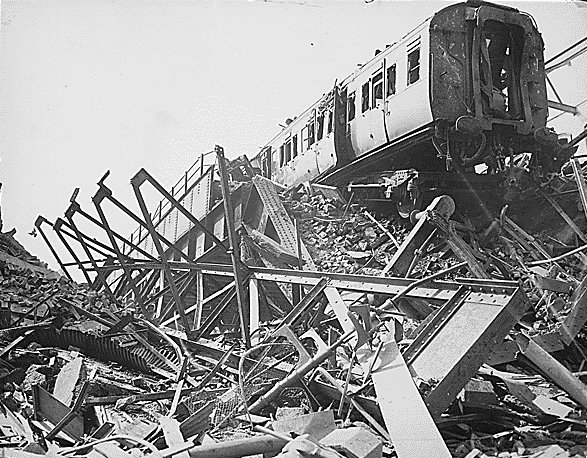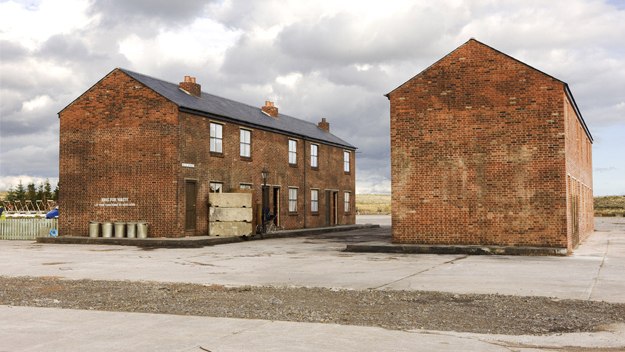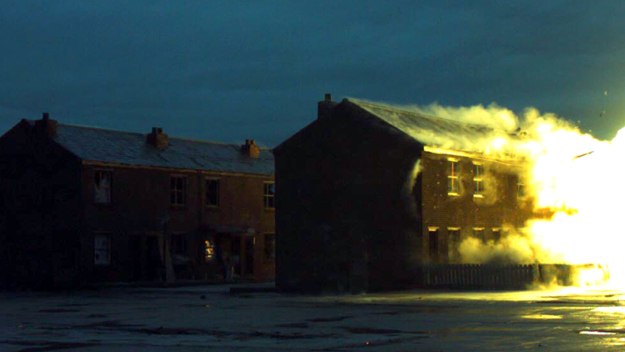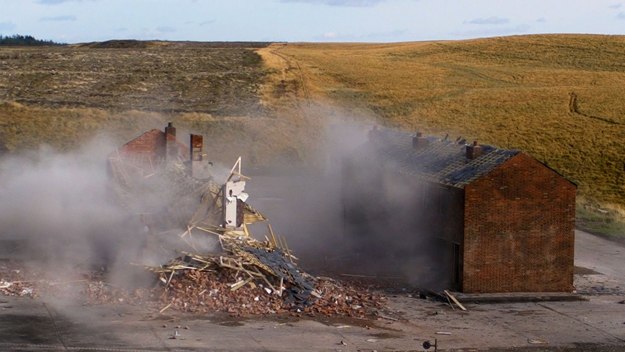It is 70 years ago this year that British cities were devastated by the Luftwaffe.
To commemorate, Channel 4 has made a new series called Blitz Street, hosted by Blackadder's "Baldrick", Tony Robinson.
In the series, replica terraced houses, similar to those built in the early 20th century all over England, have been constructed on an airfield and then blown up.
Channel 4 (run by school kids) obviously hope seeing the resultant devastation can give you some idea of what it was like to live through the Blitz, when London suffered the second Great Fire of London, which was more devastating than the original in 1666. And it wasn't only London - cities such as Birmingham, Coventry, Plymouth, Manchester, Liberpool, Newcastle, Glasow and Edinburgh were all bombed.
But one woman who DOES know what the Blitz - which killed 43,000 Britons - was like is Dorothy Hughes. Now a Chelsea Pensioner. Dorothy was just a 17 year old girl when she tried to shoot Luftwaffe planes out of the sky. She remembers the ground shaking as bombs hit, the devastation, the fires and the death. And she will also remember Britain's staunch refusal to surrender, despite everything.
Here, Dorothy recalls in vivid detail Britain's darkest hour...
HOW WE BATTLED THE BLITZ
By Dennis Ellam
18/04/2010
The Mirro
EXCLUSIVE: 70 years on, the horror of the Nazi bombing of Britain is re-lived

A double decker bus, advertising Swan Vesta matches, in a bomb crater in Balham, London, during the Blitz. October 1940.
At an age when she might have been dancing to the latest big band sounds, she was helping fire the big guns shielding London against the Blitz.
Bombs were raining down on the capital and Dorothy the trainee secretary now became Gunner Hughes, serving with the Royal Artillery in the darkest hours of World War Two.
Seventy years on, the remarkable story of how Britain's cities survived the nightly onslaught of the German air raids is being told in graphic detail for a new TV series.

A group of children sits outside a destroyed home, probably their own
To provide a close-up view of the kind of terror that was unleashed on ordinary people in their homes, the film-makers reconstructed a war-time street of terraced houses - and then devastated it with explosives.
"We still talk about the Blitz Spirit, but it's always been difficult to explain in detail just how horrible it was," says Dorothy, now 87 and a Chelsea Pensioner. "Perhaps this is the closest people will come to knowing."
For most of the Blitz Dorothy served on anti-aircraft guns in sand-bagged emplacements around London's famous parks.
Her job was to call out the co-ordinates - the calculations essential to find the targets in the sky - as the crews took aim.
"The enemy bombers followed a line along the Thames and came over in waves, blotting out the sky because there were so many of them," Dorothy says.
"Next, the ground started shaking, from the pounding of the bombs dropping and the pounding of the guns firing... it seemed like an earthquake. Every time it was frightening. You never got used to it.
"I don't know if we even ever actually hit a plane, but we were just ordered to keep firing because, as long as people could hear the guns, then it gave them some hope, a little confidence that somehow we were fighting back."
One time Dorothy was injured, hit in the foot by shrapnel. "I was back on duty within a month - but sadly I could never wear stiletto heels again," she says. "The civilians suffered more than we did, I often thought. At least we were taking action, shooting back at the enemy. But in their houses and shelters all they could do was wait and hope that when the night was over they would still be alive.

Germany bombed London, Manchester, Liverpool, Belfast, and Glasgow. In London, St. Paul's Cathedral, symbol of British spirit, survived the Blitz, despite all around it being ablaze.
"It was the same then as now - we were fighting with equipment that was out of date and less effective than the enemy's. Some of our guns had a range of just 15,000ft. So the Germans flew at 20,000ft - the best we could do was to keep them at a distance.
"The next day we would walk through the streets and there would be ruins where there had been houses, and you knew lives had been lost there.
"People would be trudging around, looking for what possessions they could find in the ruins. The old news reels can't portray it all, the constant sense of danger, the smell of cordite that was always there, and the dust that hung in the air all the time."
Before she joined up, while she was still living in her hometown of Swansea, Dorothy had already experienced the terror of war first-hand.
43,000 VICTIMS
The Blitz lasted eight months and left 43,000 civilians dead, half in London. Belfast had 1,200 deaths, Birmingham 2,240, Bristol 1,299, Coventry 1,250, Hull 1,200, Manchester 1,010, Plymouth 1,172 and Liverpool 1,700.
She returned home one afternoon to find the family home had been flattened by a stray bomb.
Her mother was trapped in the wreckage bu t , miraculously, she had been cleaning the kitchen floor beneath a marble work slab and escaped almost unhurt. "Despite everything, I didn't hate," Dorothy says. "One day a bomber crash-landed close by our position on Wimbledon Common and I saw one of the German crew - he was a boy no older than I, and he looked terrified.
"I had caught a glimpse of the enemy and they were flesh and blood, like us. From that moment, we weren't just shooting at distant shapes in the sky, we were shooting at human beings."
The girl soldiers of the Auxiliary Territorial Service like Dorothy lived in Nissen huts in the parks.

The London Necropolis Railway Station, a privately owned station in Westminster Bridge Road, after London's biggest night raid of the war. This grim railway, built in 1854 and operated by the London Necropolis Company, took coffins and mourners from Waterloo Statuon to Brookwood Cemetery in Surrey. It never re-opened after it was bombed in the Blitz.
Apart from their uniforms they were issued with two blouses, two sets of underwear and two pairs of flannel stockings. Bathing was a luxury - once a week, in cold water, in a makeshift wash house.
This night of 29th/30th December 1940 has been dubbed The Second Great Fire of London and destroyed an area arguably greater than that of the Great Fire of London of 1666. Some 1500 fires were started, including three major conflagrations. Whereas in 1666 the devastation was overwhelmingly within the City proper, in 1940 it extended far beyond. The largest continuous area of Blitz destruction anywhere in Britain occurred on this night, stretching south from Islington to the very edge of St Paul's Churchyard. St Paul's Cathedral itself was only saved by the dedication of the London firemen who kept the fire away from the Cathedral and the volunteer firewatchers of the St Paul's Watch who fought to keep the flames from firebombs on its roof from spreading.
"We were just a stroll away from some of the city's finest hotels, but they would never have let us through the doors," Dorothy says. "We roughed it out in the open, in the middle of this desolation."
In the final months of the war Dorothy and her team were moved to the South Coast, to reinforce defences against the Germans' ultimate weapon, the pilotless flying V2 bomb.
They were a formidable threat. But the gunners defeated them. Of 10,000 missiles aimed at Britain, only 2,000 got through.

For the four-part Channel 4 series Blitz Street, a terrace of two-up, two-down houses complete with a corner shop, was built on a remote military base where the buildings could be blown up. Scientists recorded the effects, discovering how a bomb blast could travel along a street, in and out of doorways, through windows and into roof spaces, shattering buildings as it went.
They also found out how some victims had their clothes ripped away or were thrown on to rooftops by shock waves, while others died without a mark on their body as the air was sucked out of their lungs.

A man is rescued from the ruins of Farringdon Market, London, after the dropping of a V-2 bomb killed over 300 people
And it confirmed one of the legendary stories of the Blitz - that many families survived by sheltering under the stairs. It was one of the safest places to be, the experts proved.
The film crew were not allowed to drop bombs from the sky, but they detonated up to 250 kilos of explosives on the set to recreate the impact of a single bomb.
The first day of the Blitz was Saturday, September 7, 1940 - a year after war had been declared - when hundreds of Luftwaffe bombers attacked London's East End.
The sirens sounded at 4.43 in the afternoon. By the time of the allclear, at five the next morning, 430 people had been killed and 1,600 seriously injured.
After that the raids continued relentlessly, every night for eight months, on cities around the UK.
In the first epiosde of Blitz Street, which is presented by Time Team's Tony Robinson, one wartime fireman in London talks of the agonising search through the rubble for survivors.
"Mums, grandparents, children - the hardest part was the babies," he said. "You just had to ignore what you saw. If they were not alive then you just left them."

A group of men playing cricket on a blitzed site during their lunch-hour with St Paul's Cathedral in the background, 1945
And a nurse recalls the horrors of what she saw in hospital.
"A woman was brought in stuck to a door, her arms outstretched as if she had been crucified," she said.
"Her clothes were blown off down to her underwear. Her husband was sobbing, 'Don't tell me my wife is dead!', but of course she was, blown up against that door."
And, of course, London was not alone in its suffering. Liverpool, Bristol, Glasgow, Plymouth and Coventry were also badly hit.
Later in the series, survivors who lived through the Coventry bombing recall the
destruction there. The Luftwaffe carpet-bombed the city, first setting it ablaze with 10,000 incendiary bombs, in an operation known as Moonlight Sonata.
It left almost 600 dead in one night in November 1940. Alan Edgson, who was six, remembers shrapnel rolling down the roof of his house, making a noise like musical instruments.
Still from Channel 4's new series Blitz Street


Tony Robinson, the show's presenter


"You couldn't tell if a bomb was coming straight at you - then you would hear an explosion, and that one hadn't hit you," he said. "But more would be following.
"Even as a child, you felt you couldn't take any more. At school they would call the register and every so often there would be a pause.
"Where's so and so? "Oh, they're dead miss, their house got hit last night."
Dorothy's war ended in 1946. The gunner went back to being a secretary, then married and raised a family, and trained to become a teacher for the last 15 years of her working life.
"The memories are still so clear... images like that, you just don't forget," she says.
Blitz Street begins on Channel 4 tomorrow at 9pm.
mirror.co.uk
To commemorate, Channel 4 has made a new series called Blitz Street, hosted by Blackadder's "Baldrick", Tony Robinson.
In the series, replica terraced houses, similar to those built in the early 20th century all over England, have been constructed on an airfield and then blown up.
Channel 4 (run by school kids) obviously hope seeing the resultant devastation can give you some idea of what it was like to live through the Blitz, when London suffered the second Great Fire of London, which was more devastating than the original in 1666. And it wasn't only London - cities such as Birmingham, Coventry, Plymouth, Manchester, Liberpool, Newcastle, Glasow and Edinburgh were all bombed.
But one woman who DOES know what the Blitz - which killed 43,000 Britons - was like is Dorothy Hughes. Now a Chelsea Pensioner. Dorothy was just a 17 year old girl when she tried to shoot Luftwaffe planes out of the sky. She remembers the ground shaking as bombs hit, the devastation, the fires and the death. And she will also remember Britain's staunch refusal to surrender, despite everything.
Here, Dorothy recalls in vivid detail Britain's darkest hour...
HOW WE BATTLED THE BLITZ
By Dennis Ellam
18/04/2010
The Mirro
EXCLUSIVE: 70 years on, the horror of the Nazi bombing of Britain is re-lived

A double decker bus, advertising Swan Vesta matches, in a bomb crater in Balham, London, during the Blitz. October 1940.
She was just 17... but the defence of the nation rested on Dorothy Hughes' slender shoulders."A woman was brought in stuck to a door, her arms outstretched as if she had been crucified."
"Her clothes were blown off down to her underwear. Her husband was sobbing, 'Don't tell me my wife is dead!', but of course she was, blown up against that door."
At an age when she might have been dancing to the latest big band sounds, she was helping fire the big guns shielding London against the Blitz.
Bombs were raining down on the capital and Dorothy the trainee secretary now became Gunner Hughes, serving with the Royal Artillery in the darkest hours of World War Two.
Seventy years on, the remarkable story of how Britain's cities survived the nightly onslaught of the German air raids is being told in graphic detail for a new TV series.

A group of children sits outside a destroyed home, probably their own
To provide a close-up view of the kind of terror that was unleashed on ordinary people in their homes, the film-makers reconstructed a war-time street of terraced houses - and then devastated it with explosives.
"We still talk about the Blitz Spirit, but it's always been difficult to explain in detail just how horrible it was," says Dorothy, now 87 and a Chelsea Pensioner. "Perhaps this is the closest people will come to knowing."
For most of the Blitz Dorothy served on anti-aircraft guns in sand-bagged emplacements around London's famous parks.
Her job was to call out the co-ordinates - the calculations essential to find the targets in the sky - as the crews took aim.
"The enemy bombers followed a line along the Thames and came over in waves, blotting out the sky because there were so many of them," Dorothy says.
"Next, the ground started shaking, from the pounding of the bombs dropping and the pounding of the guns firing... it seemed like an earthquake. Every time it was frightening. You never got used to it.
"I don't know if we even ever actually hit a plane, but we were just ordered to keep firing because, as long as people could hear the guns, then it gave them some hope, a little confidence that somehow we were fighting back."
One time Dorothy was injured, hit in the foot by shrapnel. "I was back on duty within a month - but sadly I could never wear stiletto heels again," she says. "The civilians suffered more than we did, I often thought. At least we were taking action, shooting back at the enemy. But in their houses and shelters all they could do was wait and hope that when the night was over they would still be alive.

Germany bombed London, Manchester, Liverpool, Belfast, and Glasgow. In London, St. Paul's Cathedral, symbol of British spirit, survived the Blitz, despite all around it being ablaze.
"It was the same then as now - we were fighting with equipment that was out of date and less effective than the enemy's. Some of our guns had a range of just 15,000ft. So the Germans flew at 20,000ft - the best we could do was to keep them at a distance.
"The next day we would walk through the streets and there would be ruins where there had been houses, and you knew lives had been lost there.
"People would be trudging around, looking for what possessions they could find in the ruins. The old news reels can't portray it all, the constant sense of danger, the smell of cordite that was always there, and the dust that hung in the air all the time."
Before she joined up, while she was still living in her hometown of Swansea, Dorothy had already experienced the terror of war first-hand.
43,000 VICTIMS
The Blitz lasted eight months and left 43,000 civilians dead, half in London. Belfast had 1,200 deaths, Birmingham 2,240, Bristol 1,299, Coventry 1,250, Hull 1,200, Manchester 1,010, Plymouth 1,172 and Liverpool 1,700.
She returned home one afternoon to find the family home had been flattened by a stray bomb.
Her mother was trapped in the wreckage bu t , miraculously, she had been cleaning the kitchen floor beneath a marble work slab and escaped almost unhurt. "Despite everything, I didn't hate," Dorothy says. "One day a bomber crash-landed close by our position on Wimbledon Common and I saw one of the German crew - he was a boy no older than I, and he looked terrified.
"I had caught a glimpse of the enemy and they were flesh and blood, like us. From that moment, we weren't just shooting at distant shapes in the sky, we were shooting at human beings."
The girl soldiers of the Auxiliary Territorial Service like Dorothy lived in Nissen huts in the parks.

The London Necropolis Railway Station, a privately owned station in Westminster Bridge Road, after London's biggest night raid of the war. This grim railway, built in 1854 and operated by the London Necropolis Company, took coffins and mourners from Waterloo Statuon to Brookwood Cemetery in Surrey. It never re-opened after it was bombed in the Blitz.
Apart from their uniforms they were issued with two blouses, two sets of underwear and two pairs of flannel stockings. Bathing was a luxury - once a week, in cold water, in a makeshift wash house.
This night of 29th/30th December 1940 has been dubbed The Second Great Fire of London and destroyed an area arguably greater than that of the Great Fire of London of 1666. Some 1500 fires were started, including three major conflagrations. Whereas in 1666 the devastation was overwhelmingly within the City proper, in 1940 it extended far beyond. The largest continuous area of Blitz destruction anywhere in Britain occurred on this night, stretching south from Islington to the very edge of St Paul's Churchyard. St Paul's Cathedral itself was only saved by the dedication of the London firemen who kept the fire away from the Cathedral and the volunteer firewatchers of the St Paul's Watch who fought to keep the flames from firebombs on its roof from spreading.
"We were just a stroll away from some of the city's finest hotels, but they would never have let us through the doors," Dorothy says. "We roughed it out in the open, in the middle of this desolation."
In the final months of the war Dorothy and her team were moved to the South Coast, to reinforce defences against the Germans' ultimate weapon, the pilotless flying V2 bomb.
They were a formidable threat. But the gunners defeated them. Of 10,000 missiles aimed at Britain, only 2,000 got through.

For the four-part Channel 4 series Blitz Street, a terrace of two-up, two-down houses complete with a corner shop, was built on a remote military base where the buildings could be blown up. Scientists recorded the effects, discovering how a bomb blast could travel along a street, in and out of doorways, through windows and into roof spaces, shattering buildings as it went.
They also found out how some victims had their clothes ripped away or were thrown on to rooftops by shock waves, while others died without a mark on their body as the air was sucked out of their lungs.

A man is rescued from the ruins of Farringdon Market, London, after the dropping of a V-2 bomb killed over 300 people
And it confirmed one of the legendary stories of the Blitz - that many families survived by sheltering under the stairs. It was one of the safest places to be, the experts proved.
The film crew were not allowed to drop bombs from the sky, but they detonated up to 250 kilos of explosives on the set to recreate the impact of a single bomb.
The first day of the Blitz was Saturday, September 7, 1940 - a year after war had been declared - when hundreds of Luftwaffe bombers attacked London's East End.
The sirens sounded at 4.43 in the afternoon. By the time of the allclear, at five the next morning, 430 people had been killed and 1,600 seriously injured.
After that the raids continued relentlessly, every night for eight months, on cities around the UK.
In the first epiosde of Blitz Street, which is presented by Time Team's Tony Robinson, one wartime fireman in London talks of the agonising search through the rubble for survivors.
"Mums, grandparents, children - the hardest part was the babies," he said. "You just had to ignore what you saw. If they were not alive then you just left them."

A group of men playing cricket on a blitzed site during their lunch-hour with St Paul's Cathedral in the background, 1945
And a nurse recalls the horrors of what she saw in hospital.
"A woman was brought in stuck to a door, her arms outstretched as if she had been crucified," she said.
"Her clothes were blown off down to her underwear. Her husband was sobbing, 'Don't tell me my wife is dead!', but of course she was, blown up against that door."
And, of course, London was not alone in its suffering. Liverpool, Bristol, Glasgow, Plymouth and Coventry were also badly hit.
Later in the series, survivors who lived through the Coventry bombing recall the
destruction there. The Luftwaffe carpet-bombed the city, first setting it ablaze with 10,000 incendiary bombs, in an operation known as Moonlight Sonata.
It left almost 600 dead in one night in November 1940. Alan Edgson, who was six, remembers shrapnel rolling down the roof of his house, making a noise like musical instruments.
Still from Channel 4's new series Blitz Street


Tony Robinson, the show's presenter


"You couldn't tell if a bomb was coming straight at you - then you would hear an explosion, and that one hadn't hit you," he said. "But more would be following.
"Even as a child, you felt you couldn't take any more. At school they would call the register and every so often there would be a pause.
"Where's so and so? "Oh, they're dead miss, their house got hit last night."
Dorothy's war ended in 1946. The gunner went back to being a secretary, then married and raised a family, and trained to become a teacher for the last 15 years of her working life.
"The memories are still so clear... images like that, you just don't forget," she says.
Blitz Street begins on Channel 4 tomorrow at 9pm.
mirror.co.uk
Last edited: